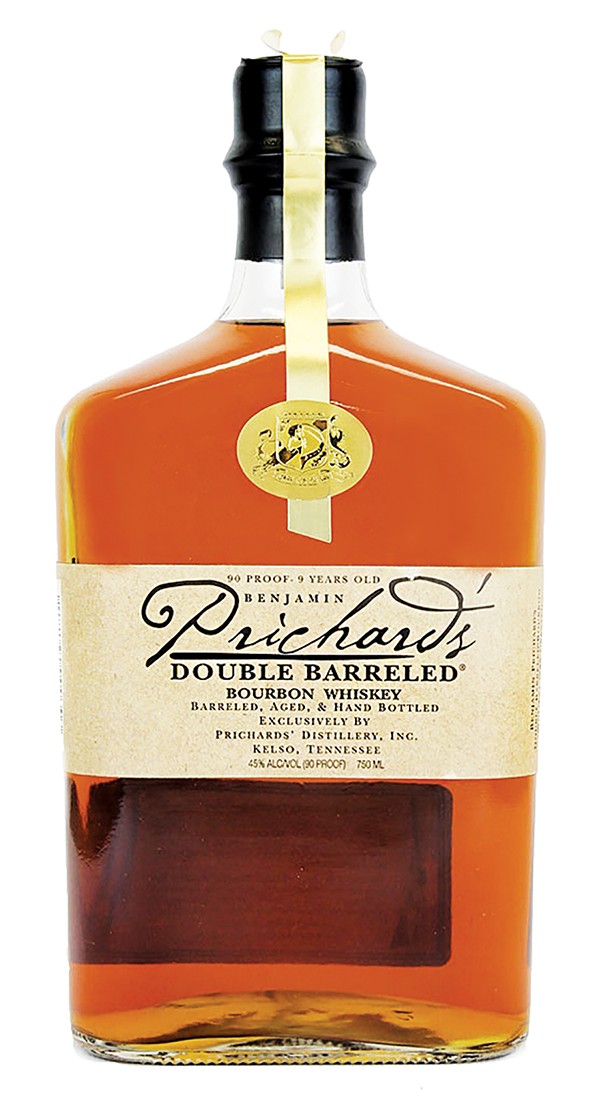Phil Prichard, the Memphis-born master distiller at Prichard’s Distillery, Inc., the rum and whiskey manufacturer located some 280 miles due east of us, has a supply-and-demand issue many distillers only dream about: His hand-crafted Double Barreled Bourbon, which typically retails for $50-60 on liquor store shelves, has been unavailable for over a year.
In 2015, supplier sales of Tennessee whiskey rose by 7.4 percent, significantly higher than the already robust 5.2 percent growth in American whiskies overall.
Yet even within the Tennessee whiskey category, Prichard’s product is unique: In a part of the state known for whiskies, ranging from Nashville-based micro-distiller Corsair to the behemoth Jack Daniel’s, which is located 17 miles north of Kelso in Lynchburg, Prichard’s facility is the only one not required by Tennessee law to filter its bourbon through maple charcoal. It’s also the only distillery to use Prichard’s exclusive Double Barreled process, which spurns over-dilution during the proof-cutting process.
The term Double Barreled, registered with the U.S. Patent and Trademark Office, is currently under legal challenge from Louisiana-based liquor giant the Sazerac Company, which owns a multitude of distilleries including Southern Comfort and Buffalo Trace, the parent company of Pappy Van Winkle’s Family Reserve.
“The biggest problem we have now is this little company wants to infringe on our trade name,” Prichard says. “It’s a silly lawsuit. A trademark is a trademark. Their modus operandi is to outspend us, but fortunately we’ve got good lawyers.”
While he’s currently bottling his award-winning rums and gearing up for brandy production at a distillery in Nashville, it can take Prichard up to a decade to create a bottle-ready batch of Double Barreled Bourbon.
“Somewhere between eight and 10 years, the two elements in those barrels — the caramelized sugars created when the barrel is burned, which make it sweet, and the oak tannins, which make it bitter — will give it that optimal balance between bitterness and sweetness,” Prichard explains.

“We are temporarily out of stock. The whiskey demand has stripped all of our aged product. We’ve laid down more barrels and we’ll have some available in a year or so,” he says.
Last winter, long after his warehouse was empty, Prichard was surprised to discover several bottles of his coveted bourbon at a shop in Winder, Georgia. “I was down there visiting with my distributor, and I decided to drop into Turtle Creek Wine and Spirits and say hello, and lo and behold, I’d be dipped if they didn’t have a whole shelf of it.”
“I bought a bottle or two,” he continues, “and a day or two after that, some guy called me, and he went up and bought everything they had. He thoroughly wiped us out of any residual stock. I’ve got 20 barrels we’ll probably release this time next year.”
That’s good news for music producer and Bo-Keys bandleader Scott Bomar, who describes Prichard’s Double Barreled Bourbon as “the best I’ve ever had in my life.”
The musician whose newest album, “Heartache By the Numbers,” was inspired by Memphis’ onetime late night bar scene — “places like Hernando’s Hideaway, beer joints and juke joints that don’t exist anymore” — discovered the bourbon when Prichard signed on as a sponsor of Staxtacular, the annual benefit the Memphis Grizzlies stage for the Stax Music Academy.
Bomar says that he drinks the bourbon “neat, or with an ice cube or two, in extreme moderation.”
For now, Bomar has switched to craft beer made by Cooper-Young’s Memphis Made Brewing Co. “There’s one I love in particular — the Soulful Ginger,” he says. “It’s a great summer beer. Sometimes flavors just overpower the taste of a craft beer, but this has such a subtle ginger flavor, which makes the beer really crisp.”
Most Memphis Made beers and other fine local craft beers are available at Madison Growler, Hammer & Ale, and on tap at bars and restaurants around town.